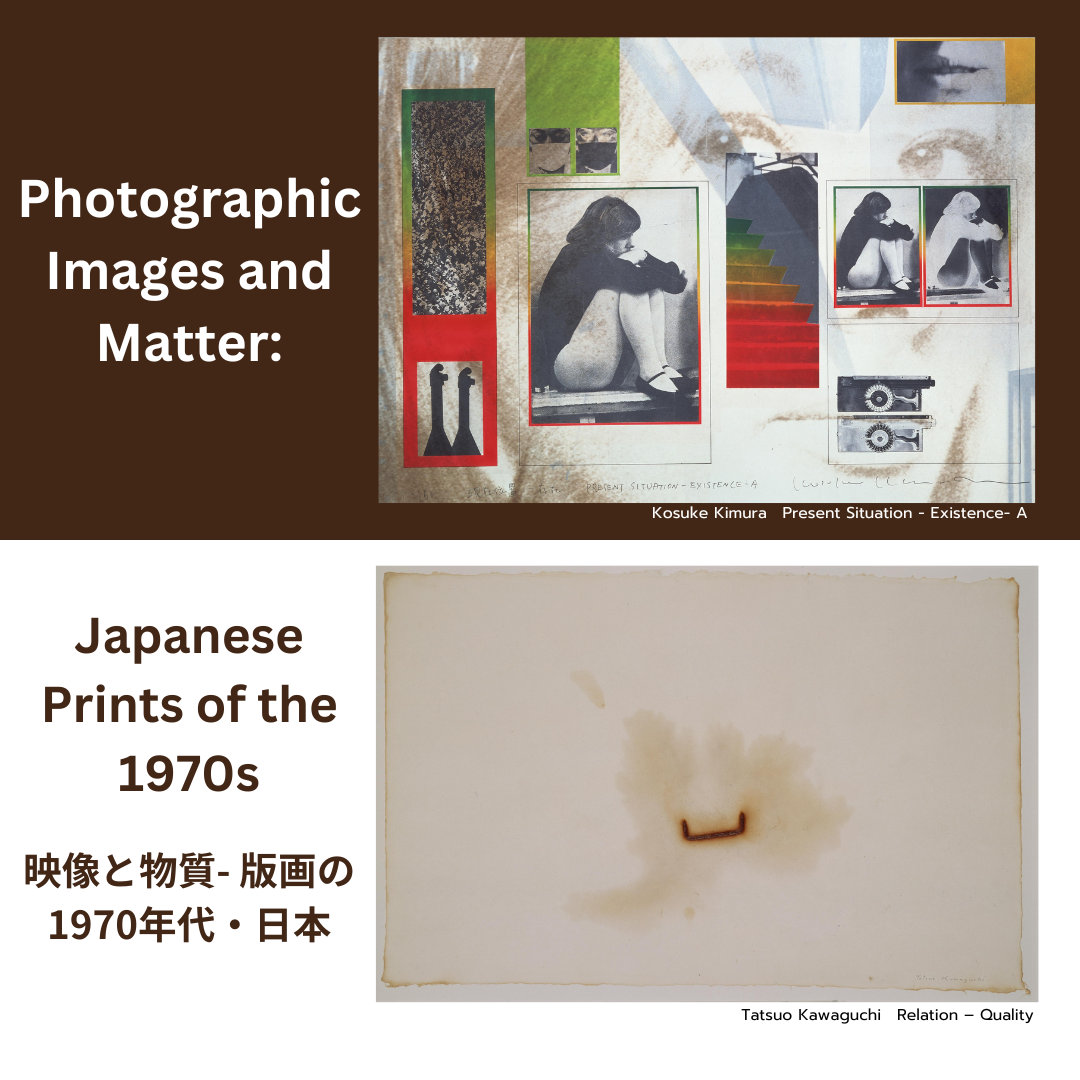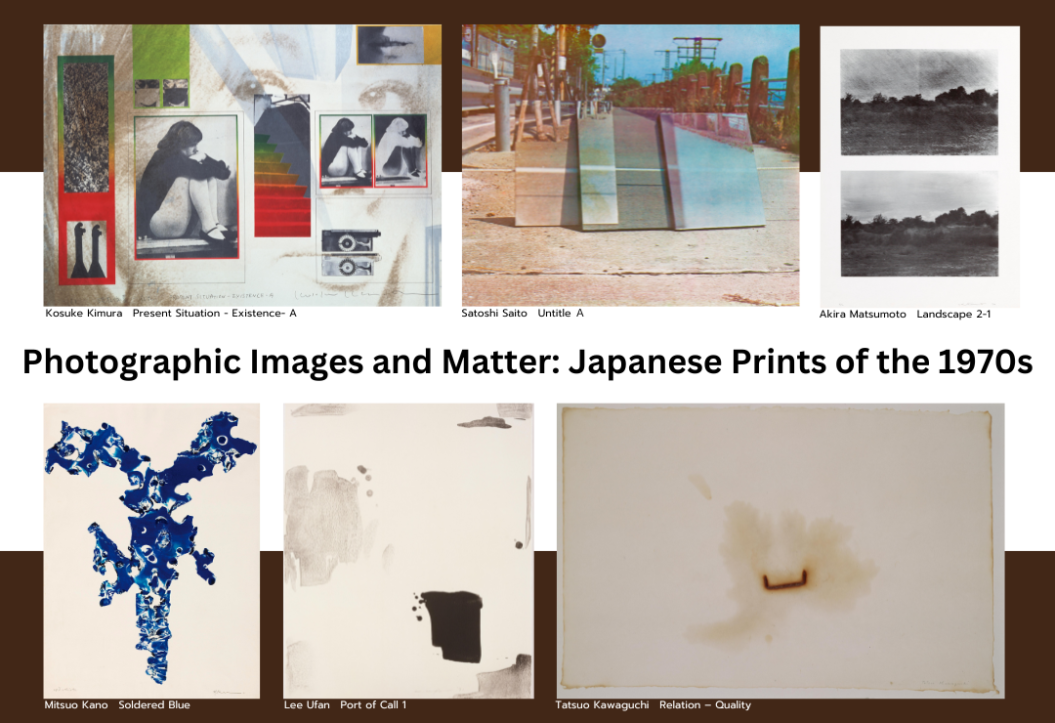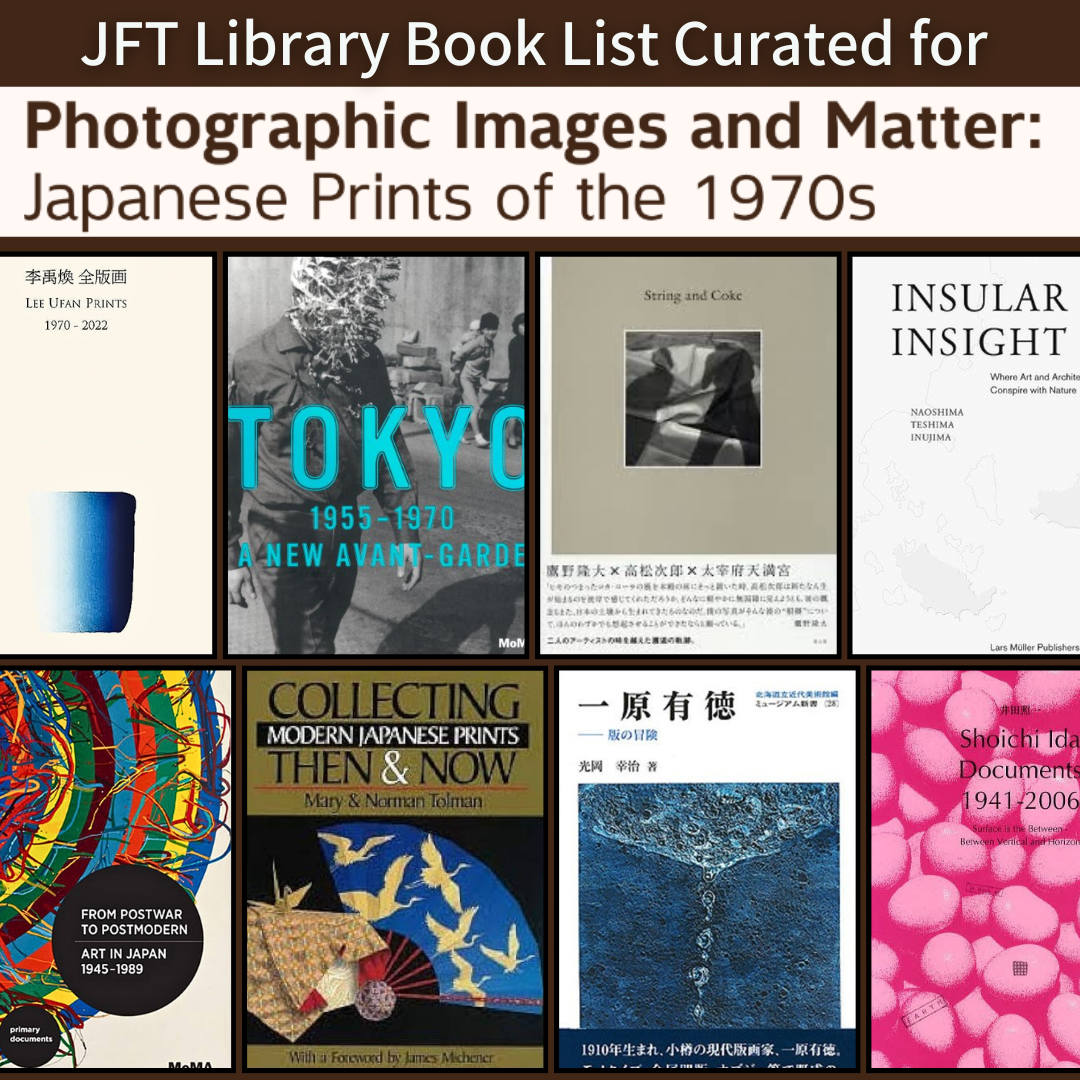Photographic Images and Matter: Japanese Prints of the 1970s

- This event has passed.
July 18th, 2024 @ 11:30 am - October 11th, 2024 @ 4:30 pm EDT
Details »


「映像と物質: 版画の1970年代・日本」
Curated by Kyoji Takizawa, Machida City Museum of Graphic Arts
Produced by The Japan Foundation in 2015
In 1957, the Japanese government launched the International Biennial Exhibition of Prints in Tokyo as a special feature of its postwar culture policy. Awarded the International Grand Prize in the sixth edition of the biennale in 1968, Tetsuya Noda transformed photographic portraits of his family into prints. His works were significant in that they exemplified the huge changes that were underway in prints internationally, confirmed that there were parallels between trends in contemporary prints and contemporary art, and suggested future developments in contemporary art. In the 1970s, there was a rapid increase in Japanese works that adopted Noda’s method of converting photographs into prints, leading to a golden age in the medium. The era also saw the rise of works that placed special importance on allowing the materials (matter) used in printmaking (print blocks, paper, ink, etc.) to speak for themselves, which was lauded as a new trend in the medium. Another significant trend was the emergence of prints with an extremely strong materiality in which the image was transformed into a material.
These autonomous expressions of photographic images and matter in the 1970s dramatically expanded the field of prints and also exerted a strong influence on trends in contemporary art. While introducing important trends in prints during the 1970s, this exhibition focuses on print-inspired trends in contemporary art of the same period.
Section 1: An Age of Photographic Expression
With the increase in photographs and printing, and the proliferation of the powerful medium of television, which accompanied the expansion of production and consumption in the 1960s and ’70s, Japanese society came to be overrun with images. During this period, new techniques such as silkscreening and offset printing, which made it easy to transform photographic images, quickly took hold. Under these circumstances, numerous works emerged in which photographic images were converted into prints through the use of photoengraving, leading to a new mainstream in printmaking. In many of these works, all traces of handiwork were eliminated in order to suppress emotional content and encode the image.
Exhibiting artists:
Tetsuya Noda野田哲也, Kosuke Kimura木村光佑, Akira Matsumoto松本旻, Satoru Saito斎藤智, Hideki Kimura木村秀樹, and Sakumi Hagiwara萩原朔美
Section 2: Images of Autonomous Matter
Between about 1968 and the early 1970s, a new trend emerged in art in which simple substances such as stone, wood, paper, cotton, and steel sheets were presented as works, sometimes alone and sometimes in combination with each other. As an extension of this movement, print works, which limited human involvement and manipulation of the image to a bare minimum, and set out to allow materials (matter) such as print blocks, paper, and ink to speak for themselves, received attention for expanding the concept of the print and giving rise to a new trend in the medium. This period also saw the materialization of images, a conscious movement that had begun in the 1950s, and an approach to production that centered on expressing something spiritual through matter, which resulted in works with a strong material quality.
Exhibiting artists:
Jiro Takamatsu高松次郎, Katsuro Yoshida吉田克朗, Koji Enokura榎倉康二, Shoichi Ida井田照一, Tatsuo Kawaguchi河口龍夫, Lee Ufan李禹煥, Mitsuo Kano加納光於, and Arinori Ichihara一原有徳
Admission: FREE
Advanced, time-specific reservations are recommended.
Hand-sanitization at the entry and wearing face-coverings on our premises are recommended.
Gallery Hours: Open on Tuesdays, Thursdays, Fridays, and Saturdays. Hourly timeslots starting at 11:30 AM, 12:30 PM, 1:30PM, 2:30 PM, 3:30 PM (4:30 PM and 5:30 PM on Thursdays)
Closed on select days: August 3 (Civic Holiday weekend), August 31 (Labour Day weekend), September 28 (National Day for Truth and Reconciliation weekend)
Exhibition Period: July 18 – October 11, 2024
Library & Gallery Opening Hours
| Monday | CLOSED |
| Tuesday | 11:30am to 4:30pm |
| Wednesday | CLOSED |
| Thursday | 11:30am to 6:30pm |
| Friday | 11:30am to 4:30pm |
| Saturday | 11:30am to 4:30pm *Closed on select Saturdays |
| Sunday | CLOSED |
*September 21: Open from 11:30 am to 2:00 pm
*Closed on Sundays, Mondays, Wednesdays, and Select Saturdays:
Canada Day weekend June 29- July 1
Civic Holiday weekend August 3-5
Labour Day weekend August 31- September 2
National Day for Truth and Reconciliation weekend: September 28-30
Thanksgiving Day weekend October 12-14


Related Programming:
Dive Deeper into the 1970s Japanese Prints with JFT Library Books!
Whether you are planning to visit or have already been fascinated by the JFT Gallery exhibition “Photographic Images and Matter: Japanese Prints of the 1970s“, add an extra layer of appreciation by checking out JFT Library’s books! To enrich your art experience, we have curated a library book list, which includes: Contemporary Japanese Prints 1, a comprehensive catalogue highlighting the inventive techniques and artists of the 1970s like NODA Tetsuya, ICHIHARA Arinori, IDA Shōichi, and KAWAGUCHI Tatsuo; Japanese Art after 1945: Scream Against the Sky, an illustrated survey revealing vibrant avant-garde movements that shaped postwar art scene including Mono-ha (“School of Things”); Hideki Kimura: Works, 1972-1990, a catalogue raisonné showcasing Kimura’s innovative use of photoengraving and silkscreen techniques, reflecting his exploration of reality’s fragmented nature; and more! These curated books are currently on display in our library right next to the gallery. Don’t miss this opportunity to delve deeper into this pivotal period in printmaking!
Apply for a new library card or renew your expired card here.

